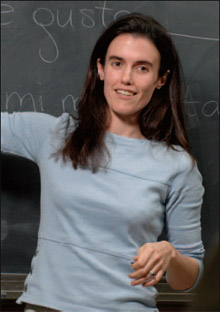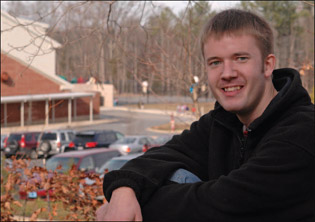

A publication of The Graduate School, University of North Carolina at Chapel Hill
On-Line Version Spring 2006
Home | Back issues | About us | The Graduate School | UNC-Chapel Hill | Make a gift
Mentoring in Action
Graduate Students Lend a Hand in Schools
 |
|
Nutrition student Amy Dean helped prepare underprivileged high school students for college, and works on issues of child nutrition. |
As a former teacher of underprivileged high school students, first-year nutrition master’s student Amy Dean has seen first-hand the obstacles many students must overcome in order to succeed.
Dean, recipient of the Kay Wagoner and Ken May Scholars for Tomorrow Fellowship and a Graduate School Merit Assistantship, spent two years teaching Spanish at Southern Vance High School in Henderson, North Carolina. She was assigned to the school by Teach for America, a public-private partnership that places outstanding college graduates at schools serving low-income students.
It was in Henderson that Dean, like many Carolina graduate students, realized the importance of serving as a mentor and providing a positive role model to young students.
“I believe that if you work hard you can succeed, and that’s what these kids need to hear,” Dean said. “Coming in and being a young person who is excited and not jaded is important for these students.”
One of the problems facing Dean’s students in Henderson was that many were trying to become the first in their families to attend college, so they often lacked academic role models.
To help overcome this, Dean joined the advisory committee of the school’s Advancement Via Individual Determination (AVID) program, a national college-readiness organization that equips first-generation college students with the skills necessary to succeed.
“It is a program for your middle-of-theroad kid who, with some extra help and guidance, could go to college and succeed in college,” she explained.
Dean was involved with supporting the school’s four AVID teachers and selecting promising students to participate. The teachers served as mentors to the 60 selected students, helping them develop study skills, set academic goals and stay focused.
“The kids can go to the teachers if they have problems or need some encouragement,” Dean said. “They are able to maintain their relationship with one teacher for the entire year, which is really good for them.”
 |
| Biostatistics
student Ryan May volunteered as a math tutor in local schools while
an undergraduate. |
Dean is just one of many Carolina graduate students who have served as mentors in their communities.
As an undergraduate at the University of Washington, first-year biostatistics doctoral student Ryan May coordinated a program that placed math and statistics students from the university in mentoring roles in community schools. With the public schools overcrowded, some students were at risk of being left behind.
“The teachers didn’t always have the time to teach those kids, and a lot of the kids didn’t care any more,” May said. “A lot of those students who were falling behind, the teacher would give to me and I’d go work with them in the back for a few months.”
May, who is supported by a Traineeship in the Biostatistics of Genomics and Cancer from the National Cancer Institute and a Graduate School Scholars for Tomorrow Fellowship, said most of the students responded to the increased personal attention.
“It made a big difference, just in terms of their attitude,” he said. “If you really get to know them and ask what’s going on, just kind of be a friend, they turn right around.”
Both May and Dean plan to continue their mentoring work in Chapel Hill. May plans to tutor local students in math, and Dean looks forward to providing nutrition lessons to children at area schools.
Dean also plans to make the drive up to Henderson from time to time to work with students at risk of poor nutrition.
“Since Henderson is my motivation for doing this, it will be great to get back up there and stay involved,” she said.
- Erik Holmes
© 2006, The Graduate School, The University of
North Carolina at Chapel Hill
All text and images are property of The Graduate School
at the University of North Carolina-Chapel Hill. Contact Sandra Hoeflich
at shoeflic@email.unc.edu
to request permission for reproduction.